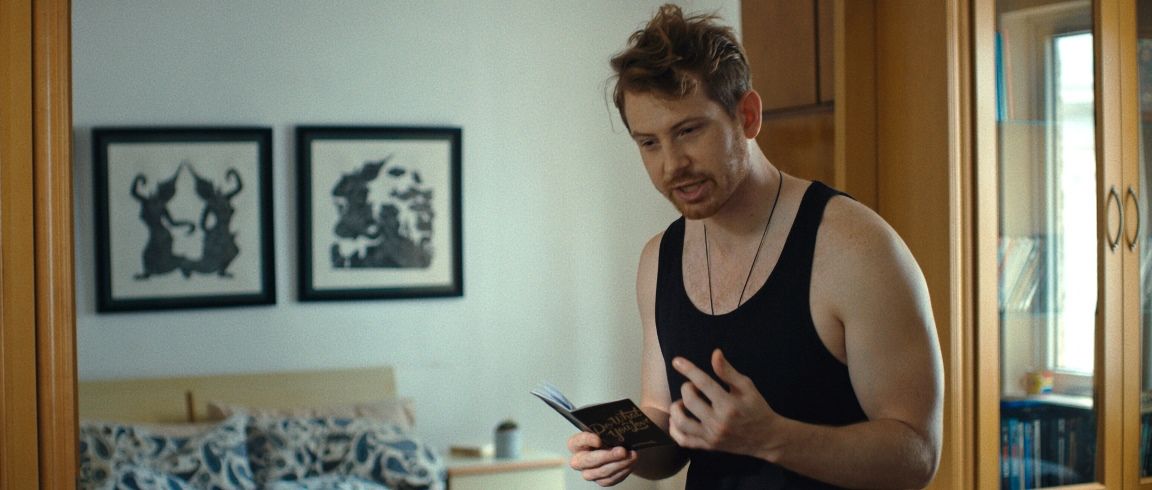The Second Page takes a look at the strange—and, at times, unbelievable—world of Chinese film and television through the eyes of a foreign actor working in Shanghai. Writer-director Justin M. Scott discusses improving his craft, keeping pace with change, and the story behind his upcoming short.
The Second Page explores a day in the life of Archie (played by Archibald McColl), a foreign actor in Shanghai who finds himself caught up in a series of bizarre events after being dropped into a last-minute audition for a major TV show. When things fail to go the way he had hoped, coincidence—or fate—ultimately steps in to offer Archie an unexpected shot at finding the closure he is looking for.
For writer-director Justin M. Scott, The Second Page marks the next step in a seven-year personal journey in China and a chance to make the leap from directing commercials into short form film-making. As his first major narrative effort shot in China, the project also offered him the opportunity to tap into the vast pool of talent in the Shanghai indie crowd.
“It’s been a great way to introduce myself to the community. I’ve been living in the commercial world for a while, so it’s been refreshing to meet people equally passionate about film,” he says. “It’s not easy to make films, but having people who understand what you’re going through and can offer a word of encouragement or advice, that’s what makes a film scene truly valuable.”

The idea for The Second Page originally stemmed from a talk Scott had with McColl about his own adventures working as an actor in China. While not entirely autobiographical, he says that even some of the film’s most outlandish—and unbelievable—moments are still largely true to life.
“Archie has had some amazing, crazy experiences in the industry and it seemed like a no-brainer to take some of that and craft it into a story,” Scott says. “I guarantee, ask any foreign actor what they think of the film and they’ll probably say it isn’t ridiculous enough.”
"Archie has had some amazing, crazy experiences in the industry and it seemed like a no-brainer to take some of that and craft it into a story."
On a deeper level, the film also offers viewers a look at the rapid pace of change China has experienced in recent years. And, as Scott explains, the story serves as a metaphor for some of the effects this transformation is having on the people living through it.
“Whether you are a laowai or Chinese, I don’t think anyone can escape the sensation that the country is changing at a blistering clip. It’s very easy to feel left in the dust,” he says. “Of course, China offers so much opportunity for all of us—which is great—but that anxiety of feeling left behind, I really do think we all have it to a certain extent.”

Impressively, after coming up with the initial concept, Scott embarked on what turned out to be a wild two-week effort in which he took the production from script all the way to camera. What is more, due to both schedules and the costs involved, the entire film had to be shot in just one day.
“I don’t recommend anybody to shoot a thirteen-minute script in a day. It was really hard and a lot of scenes didn’t get the treatment and care I think they needed,” he admits. “The tight schedule came out of necessity—locations, crew, and actors, not to mention budget—it just had to be done in a day.”
"Watching him rise to the occasion and become that character the way he did—that was true movie magic right there."
Despite the pressure, Scott says the process of taking what had only been just an idea in his head and turning it into a completed film was filled with highlights. In particular, he says it was extremely rewarding to watch McColl take over the on-screen role he had envisioned for him.
“There were some intense and challenging scenes in the film for Archibald, which required not only acting chops, but a really good command of Chinese, too,” Scott says. “Watching him rise to the occasion and become that character the way he did—that was true movie magic right there.”

While Scott admits he encountered numerous unexpected hardships along the way, he also says he is grateful for the people who helped navigate the production’s challenges and says he is focused on continuing to improve his craft.
“Overall, I’ve learned how to organize a film in this city, and create a workflow from idea to post that works efficiently,” he says. “You can’t shoot indie projects the way you would a commercial and you can’t import the way you shot back in your own country. There are unique challenges here that you have to adjust and adapt to—I definitely hope to get better on the next film.”
As for the one he has just completed, Scott says he just wants people to have a good time watching it.
“I really do hope the film can be an enjoyable experience for both foreign and Chinese audiences,” he says. “If it makes people think a little about how fast this country is developing and value the things and people around them a little more, that would be the cherry on top.



